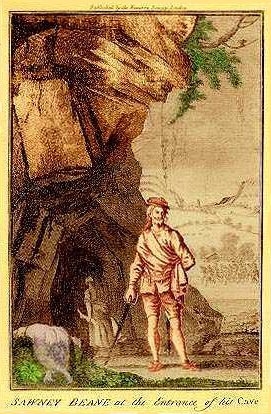Anti-Scottish sentiment
Anti-Scottish sentiment refers to negative feelings, prejudice, or discrimination directed towards Scotland, its people, its culture, or its diaspora. Historically, anti-Scottish sentiment has manifested in various forms, ranging from institutional discrimination and political suppression to cultural denigration and stereotyping. The roots of such sentiments can be traced back to various historical, social, and political contexts, including conflicts between Scotland and England, as well as broader British imperial and colonial attitudes.
Historical Context[edit | edit source]
The history of anti-Scottish sentiment is often intertwined with the political and military conflicts between Scotland and England, most notably during the Wars of Scottish Independence in the late 13th and early 14th centuries. The Act of Union 1707, which led to the political union of Scotland with England to form the Kingdom of Great Britain, was met with mixed reactions and has been a source of contention and identity politics, contributing to anti-Scottish sentiment in some quarters.
In the 18th and 19th centuries, the Highland Clearances and the aftermath of the Jacobite risings also contributed to negative perceptions of Scots, particularly in the English press. During this period, Scottish people were often depicted as rebellious, backward, or uncivilized, reinforcing stereotypes and prejudices that have lingered in various forms.
Modern Manifestations[edit | edit source]
In contemporary times, anti-Scottish sentiment can be observed in various contexts, including media representation, political discourse, and social attitudes. Stereotypes of Scots as miserly, aggressive, or parochial persist in some areas, often perpetuated by jokes, caricatures, and certain media portrayals. Politically, debates surrounding Scottish independence and Scotland's role within the United Kingdom have also surfaced expressions of anti-Scottish sentiment, sometimes framed in terms of economic dependency or political obstinacy.
Cultural Impact[edit | edit source]
Anti-Scottish sentiment has had a significant impact on Scottish identity and culture. It has influenced the way Scots perceive themselves and their place within the UK and the wider world. In response to negative stereotypes and discrimination, there has been a resurgence of interest in Scottish history, language, and culture, with movements aimed at preserving and celebrating Scottish heritage as a means of countering prejudice and fostering a positive national identity.
Countermeasures and Responses[edit | edit source]
Efforts to combat anti-Scottish sentiment have taken various forms, including educational initiatives aimed at promoting a more nuanced understanding of Scottish history and culture. Political and social campaigns have also sought to address and challenge discriminatory attitudes and practices, advocating for equality and respect for all parts of the UK and its diverse populations.
See Also[edit | edit source]
Search WikiMD
Ad.Tired of being Overweight? Try W8MD's physician weight loss program.
Semaglutide (Ozempic / Wegovy and Tirzepatide (Mounjaro / Zepbound) available.
Advertise on WikiMD
|
WikiMD's Wellness Encyclopedia |
| Let Food Be Thy Medicine Medicine Thy Food - Hippocrates |
Translate this page: - East Asian
中文,
日本,
한국어,
South Asian
हिन्दी,
தமிழ்,
తెలుగు,
Urdu,
ಕನ್ನಡ,
Southeast Asian
Indonesian,
Vietnamese,
Thai,
မြန်မာဘာသာ,
বাংলা
European
español,
Deutsch,
français,
Greek,
português do Brasil,
polski,
română,
русский,
Nederlands,
norsk,
svenska,
suomi,
Italian
Middle Eastern & African
عربى,
Turkish,
Persian,
Hebrew,
Afrikaans,
isiZulu,
Kiswahili,
Other
Bulgarian,
Hungarian,
Czech,
Swedish,
മലയാളം,
मराठी,
ਪੰਜਾਬੀ,
ગુજરાતી,
Portuguese,
Ukrainian
Medical Disclaimer: WikiMD is not a substitute for professional medical advice. The information on WikiMD is provided as an information resource only, may be incorrect, outdated or misleading, and is not to be used or relied on for any diagnostic or treatment purposes. Please consult your health care provider before making any healthcare decisions or for guidance about a specific medical condition. WikiMD expressly disclaims responsibility, and shall have no liability, for any damages, loss, injury, or liability whatsoever suffered as a result of your reliance on the information contained in this site. By visiting this site you agree to the foregoing terms and conditions, which may from time to time be changed or supplemented by WikiMD. If you do not agree to the foregoing terms and conditions, you should not enter or use this site. See full disclaimer.
Credits:Most images are courtesy of Wikimedia commons, and templates, categories Wikipedia, licensed under CC BY SA or similar.
Contributors: Prab R. Tumpati, MD



